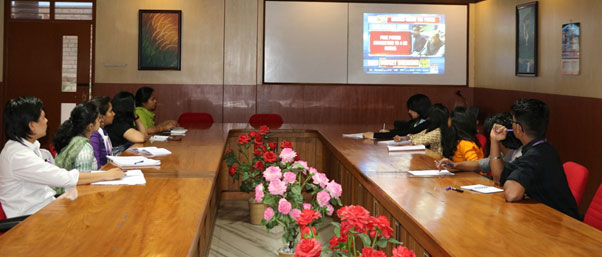
Best Practices
Outstanding Milestone of 100% Scopus Publication
The Department of Economics, Kristu Jayanti College, Bengaluru, extends its heartfelt congratulations to all the students of MA Economics Batch of 2023–2025 for achieving an outstanding milestone of 100% Scopus publication. The batch successfully published 26 research papers in the esteemed Springer Nature Book Series: Advances in Business and Technology Education. This remarkable accomplishment reflects the students' unwavering dedication to academic excellence and their commitment to producing high-quality, impactful research. It also highlights the department's sustained efforts to foster a robust research culture and guide students toward significant scholarly contributions. This achievement stands as a testament to the institution's academic rigor and dedication to nurturing future leaders in economics.
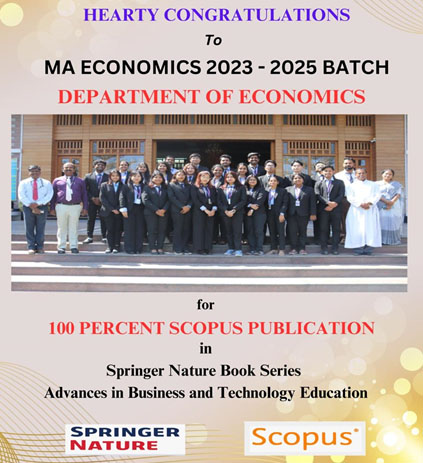
Student Lecture Series II on Contribution of Nobel Prize Winners for Economic Sciences 2021
Department of Economics, organized the student lecture series II on the contributions of Nobel Prize winners for economic sciences 2021. The event was conducted on 29th October 2021 for MA Economics students. Four student Panelists of 3rd semester MA Economics shared information on Prof David Card, Prof. Joshua D Angrist, and Prof.Guido W Imbens, who secured Nobel Prize for their empirical contributions to labour economics and causal relationships. A total of 31 students of MA Economics participated in the lecture series. Each student made informative presentations and the time allotted for each was 10 minutes. At the end of the presentation, the students put forward many queries which were answered accordingly.
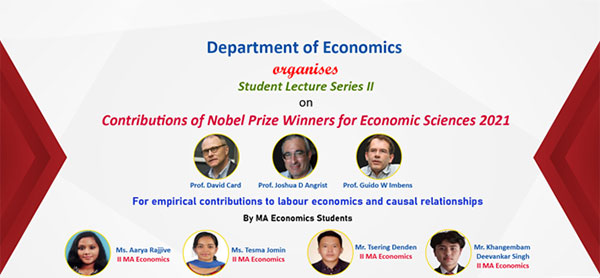
International Research Interaction on the topic ‘Spatiotemporal Impact of Covid19 Lockdown and Reopening on Environment’
The Department of Economics Organized an International Research Interaction on the topic ‘Spatiotemporal Impact of Covid19 Lockdown and Reopening on Environment’ as a part of Research Forum activity. Ms.Qian Liu (Research Scholar, George Mason University, USA) was the Resource Person. The resource person started the discussion on meteorological variations, lockdown events which contribute to environmental preservation and economic reopening and planning.Ms.Qian Liu emphasized analyzing the correlation between COVID-19 mitigation policies and the variations, impact of night light in China, impact on air pollution in California, and impact of the second wave in India. She concluded that the lockdown and reopening policies have had crucial influences on air pollution emissions and nightlight radiances. She opined that the lockdown policies generally reduced the concentration of air pollutants and night light radiances. She suggested the students have to investigate other affected environmental factors, such as aerosol, and conduct a more comprehensive error analysis. There was an interface session wherein, the students posed various questions and the resource person clarified all of them.
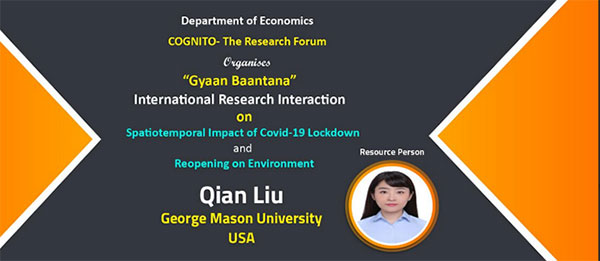
Panel Discussion Series on ‘Importance Of Studying Economic Thought’
Department of Economics in collaboration with Universiti Kebangsaan Malaysia organized an International Panel discussion on ‘Importance of Studying Economic Thought ‘on 12th November 2021. Dr.Sivasubramanian was the Moderator and Tesma Jomin, Lourembam Anirjeet Singh, Neema Nibu and Jomol George, were the four student panelists of final year MA Economic for the discussion from Kristujayanti College, (Autonomous) and Thurga Devi, Desalini Priya, Mohamad Faiz and Narul Aisyah Binti Zukari were the four panelists from the Faculty of Economics & Management of Universiti Kebangsaan Malaysia. The eight panelists discussed different aspects of economic ideas of Mercantilism and Physiocracy which are required for attaining upcoming economic improvement of the Global economy.The panel discussion concluded with Dr.Sivasubramanian, moderator of the event by giving noteworthy imminent and view on the topics discussed.
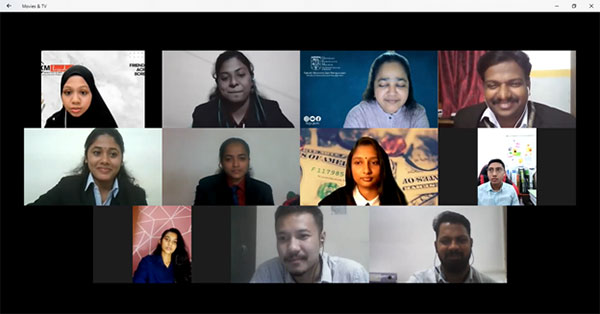
Pre- Budget Survey of the Union Budget 2020
A small survey was conducted by the students of I and II year MA Economics on Union Budget 2020-121 after watching the live telecast of budget staging by collecting feedback of people about Union Budget 2020-21. According to the findings of the survey, 54% respondents are in favour of the enlarged rural credit availability was up to 15 lakh crore and that it will contribute to agriculture production. Schemes of “Kisan Rail” and “Krishi Udaan” for a seamless national cold supply chain for perishables; and expansion of PM-KUSUM to provide 20 lakh farmers for setting up stand-alone solar pumps. 22% respondents agree that Rs 27300 crore would be allocated for development and promotion of Industry and Commerce for the year 2020-21.24% are of an opinion that budget is gender subjective. 41% are happy with an increased aid towards the MSME sector, from the existing Rs. 1 crore to Rs. 5 crore. The survey states that 65% are in favour of the Budget, 19% are against the Budget and 16% are neutral to the Budget. Even though there are defects in the budget, the considerate from the survey is that the Budget 2020-21 will have a decent encouraging effect on the Indian Economy.
The Department of Economics (PG), Kristu Jayanti College (Autonomous), Bengaluru, organized a Value-Added Course on Wealth Management for the students of II MA Economics from 9th December, to 16th December 2019. The objective of conducting the Value Added Course was to understand the concepts and theories of Wealth Management and to apply theoretical knowledge and skills in practical situations.
Dr. Vinodha Devi, Ms. Madhu Druvakumar, Dr. T. K. Murugesan, Dr. Krishnamoorty & Ms. Pushpa A were the resource persons of the Value-Added Course, Webinar. 14 participants, including the first and second year Post graduate students, from the Department of Economics and Master of Commerce attended the programme.
Resource persons spoke about the Wealth Management, investment process, Equity, tax savings options, stock exchange functions, types of trading, selection of Portfolio and finally there was a conduct of a virtual trading game session. The resource persons emphasised on the learning essential terms, concepts, theories and principles of Wealth Management.
Resource persons also reminded the students the importance of Wealth Management, In case of which, they need to act responsibly in this highly regulated financial system and they guided the participants to respond to the challenges brought about by the altering nature of the financial sector.
Participants on their feedback for the programme commented that, they equipped with, Decision making abilities and wealth management capabilities in the modern & complex financial system. Resource persons answered all the queries raised by the audience and each session concluded with an interactive question and answer session.
Student Seminar Series
Objective: To provide Economics students a platform to enhance their skill of presentation and conduct of interactive sessions on recent economic issues.
Date: 25 -31 July 2018
Participants: Students of V BA HEP
Resource Persons: Students of III MA ECONOMICS
Second year MA economics students addressed the V BA HEP students with different topics such as Foreign Exchange Market, Energy Crisis in India, Impact of Tariff, Terms of Trade, Modern irrigation System in India followed by interactive sessions. The Seminar series gave exposure to the MA Economics students to practise the theoretical knowledge. The study examines some challenges faced by III Semester MA economics students during their teaching practice, including classroom management.
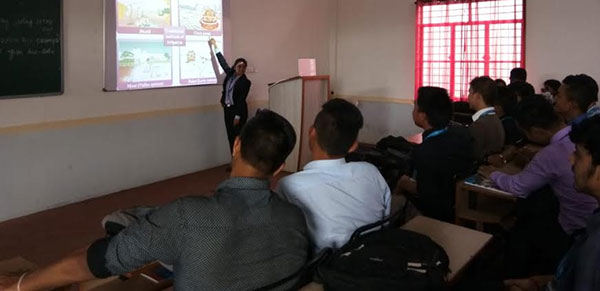
Date: January 16th & 18th 2018
Participants: Students of IV BA HEP
Resource Persons: Students of II MA ECONOMICS
Session 1: Application of Statistics in the field of Economics
1. Shalu K S, II MA ECONOMICS
2. Susanna Sajeev, II MA ECONOMICS
Students explained about Mode, conditions of Using Mode and its uses with calculations Methods. They have covered definition calculation based on types of data, formulas and interpretation.
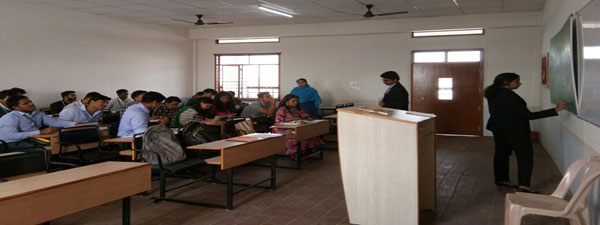
Session 2: Role and responsibilities of Commercial Banks in India
Participants: Students of II BA HEP
Resource persons:
1. Gayathri V, II MA ECONOMICS
2. Deepa Das, II MA ECONOMICS
They explained the functions of Commercial banks in an elaborate manner. They conducted a quiz on banking sector reforms in India. Students participated in the quiz actively and clarified many doubts related with the Commercial Banks.
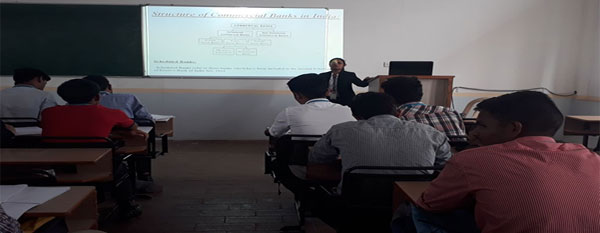
Session 3: Role of RBI and its functions
Participants: Students of II BA HEP
Resource persons:
1. Sunnon, II MA ECONOMICS
2. Hemavathi, II MA ECONOMICS
Presenters shared recent changes in the monetary policy of RBI and its influences on Economic Growth with a recent data. Audience asked many sensible doubts to the presenters which was addressed well by the presenters. It was an Informative session.
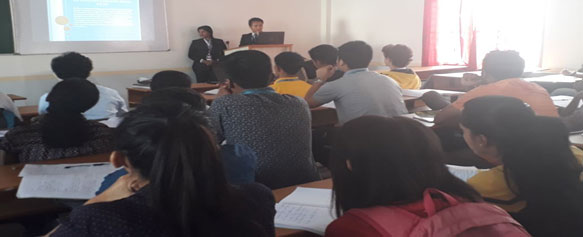
Session 3: Balanced regional development in India
Participants: Students of VI BA HEP
Resource persons:
1. Pemchon, II MA ECONOMICS
2. Niloto, II MA ECONOMICS
It was a great experience sharing and learning new things to the students. The students were interacted and response with the clear idea. Presenters discussed how to correct the economic imbalance in backward regions. Students shared their own experience of their states. Finally they conducted few team building Games too. Students of VI BA gained a great experience.
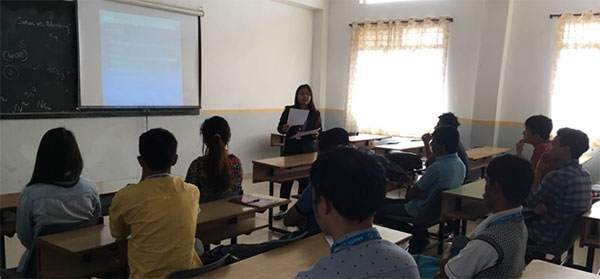
Date: 09/08/2017 & 23/08/2017
Classes Attended
1. V BA (HEP)
2. III BA (HEP)
Name and details of the Resource Person:
1. Mr. Awungshi Meyer, III Sem MA Economics
2. Mr. Fahad T H, III Sem MA Economics
3. Ms. Shama Stephen, III Sem MA Economics
The program started with introduction of resource persons and their objective of conducting the session. The audience was given a brief introduction of tax structure and methods of taxation in India. Major shortcomings of the previous tax system were explained and considered as the reasons for the need of tax reforms in India. A detailed historical background of GST law is explained by Mr. Fahad. The meaning and features of GST in India were explained in simple words by Ms. Shama. The working of GST is explained with the help of example and video by Mr. Awungshi. The benefits of implementing GST were discussed with the audience and some points of criticism were also put forward by audience. The session was concluded with the expectation that GST will bring positive effects on economy. The session was open for question answer and interaction where everyone was active enough and interacted well.
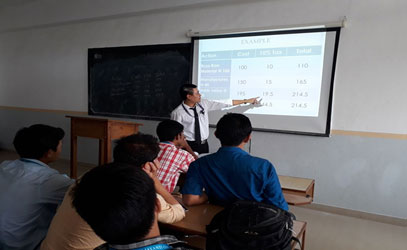
Students Colloquium
Objective: To bring economics students together on one platform to learn to interact, discuss and critically analyse the current economic policies and reforms.
Date – 24th July 2018
Department of Economics conducted Student Colloquium-2: DEBATE on “IS INDIA ON THE TRACK OF PLANNING” by the students of III Semester MA Economics. The students spoke on favorable and unfavorable points on the given topic with recent facts provided by Government websites to support their own arguments which were very useful to everyone and it helped all the students to enrich their skills and enhanced their knowledge. The colloquium was very beneficial to all the students.
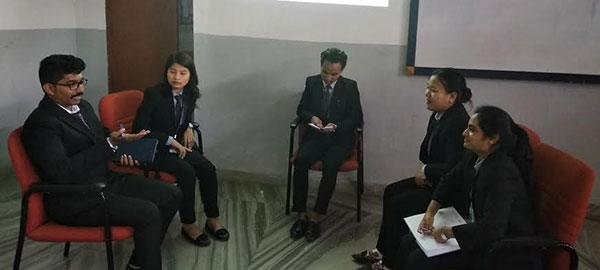
Date – 6th July 2018
Department of Economics conducted Student Colloquium-1: Group Discussion on “World Cup -Will it reinvigorate Russia’s stagnating sectors of the economy with an influx of foreign visitors and spending” by the students of III Semester MA Economics. The students discussed about impact of organizing World Cup in reinvigorating Russia’s stagnating sectors of the economy. The Group discussion was very useful to everyone and it helped all the students to enrich their skills and enhanced their knowledge. The main points discussed were transformation of Russian Economy from centrally planned economy to a globally integrated market economy, trade pattern of Russia in the last 20 years, crisis and stagnation in Russia, contribution of World cup to Russian Economy.
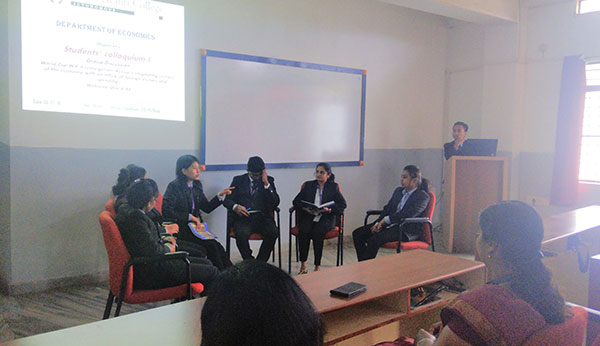
The 5th student’s Colloquium; Group Discussion on Corporate Social Responsibility (CSR) was conducted on 11th of April 2018, by the Department of Economics at Kristu Jayanti College with the objectives to know about the roles and functions of Corporate Social Responsibility and to share/impart the knowledge among students about the impacts of CSR in the society. The session started at 1:45 pm in the class room (113) and continued for an hour. The session began with welcoming of the participants followed with brief introduction on the topic CSR to the Teachers and students by Sunon G Zhimo a student of 1st year MA Economics. There were totally 7 participants; each shared their views on the topic. The students spoke on various issues on CSR which was very useful to everyone. The colloquium was very beneficial to all the students.
Date: 31.1.18
Title: Presentation on Crisis
Department of economics conducted Student Colloquium on the 31-01-2018 of January, 2018. Students reviewed the rationale behind some of the economic crisis.
1) The Financial crises 2008 by Shalu Shajan.
2) OPEC crises by Deepa Das
3) Greece crises by Gayathri V.R
The students presented the brief historical background of the economic crisis and discuss the causes and consequences of recent economic crisis. Later, the forum was open for interaction among the students to discuss the measure which could have taken to avoid the crisis.
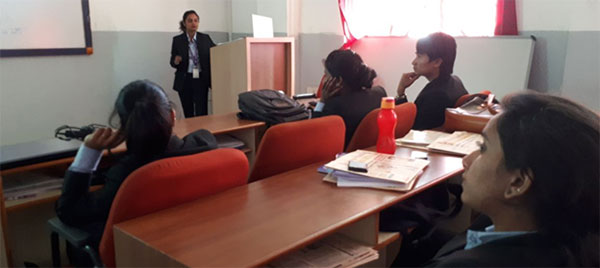
Date: 10.1.18
Title: Inclusive growth and sustainable development
Objective:
1. To increase the evaluating capabilities of the students by a deep quantitative and theoretical study on the articles.
2. To provide a forum for the students to present their creativity in studying an article on various economic issues.
Department of Economics conducted a student colloquium on the 10th of January, 2018. Our 11 students reviewed various articles under the guidance of faculty members. The first session started at 11 am in the panel room and continued for an hour. The second session started at 1:50 pm for an hour. The introduction was given by Niloto Chishi, a student of 1st year MA Economics. She introduced the teachers, the topics and the students. There were totally 7 teams to present the topics on article review as follows..
1) Empirical study on relationship between health expenditure and health aspects of HDI --- by, Fahad (2nd MA economics)
2) Liberalization and general working condition “A study of fish processing industry in Kerala”. ---by, Awungshi Meiyar (2nd MA economics).
3) Public expenditure and economic growth: a case study of India. –by, Shama Stephen (2nd MA economics).
4) Liberalization and general working condition “A study of fish processing industry in Kerala”. –by, Shalu K S and Hemavathi V (1st MA economics).
5) International trade and economic growth: An empirical evidence from Nigeria.—by, Niloto K Chishi and Susanna Sajeev (1st MA economics).
6) Income diversification: a study on Indian banking system ---by, Pemchon Muivah and Sunon G Zhimo (1st MA economics).
7) General evolution of crypto currency in India and world. ---by, Gayathri V R and Deepa Das (1st MA economics).
The students spoke on various issues on economics which was very useful to everyone and it helped all the students to perfect their article review skills and enhanced their knowledge. The colloquium was very beneficial to all the students.
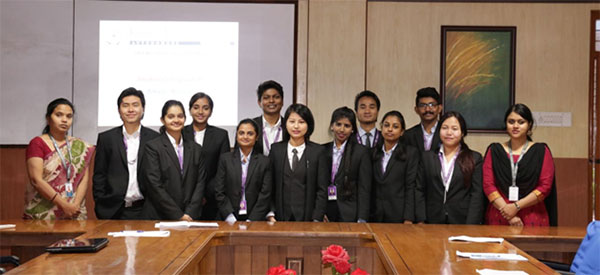
'Cognitio' (Research Forum)
Objective: To nurture the analytical skill of economics students by motivating them to participate in research activities through open discussions on importance of research in academics and guiding them in writing research papers.
A small survey was conducted by the students of I and II year MA Economics on Union Budget 2018-19 after watching the live telecast of budget presentation by collecting feedback of people about Union Budget 2018-19. According to the findings of the survey, 49% respondents are in favour of the increased rural credit of 1Lakh and that it will contribute to agriculture production. 45%respondents are against the fact that the reduced corporate tax of 25% for 250 crore turnover companies will create employment opportunities. 45% respondents agree that increased disinvestment target of 80,000 crore, that favours privatisation, will help the nation grow. 38% are of an opinion that budget is gender biased. 54% are in favour that the world’s largest health protection scheme will have an actual effect on health care sector. 38% are happy with the increased standard reduction of 40,000 on income tax. 54% are favouring the scheme ‘rise – revitalizing infrastructure in school education’, and agree that there will be a positive effect on the education system. 77% are against the automatic revised salary of MPSs.
The survey states that 61% are in favour of the Budget, 16% are against the Budget and 23% are neutral to the Budget. Even though there are flaws in the budget, the understanding from the survey is that the Budget 2018-19 will have a decent positive effect on the Indian Economy.
